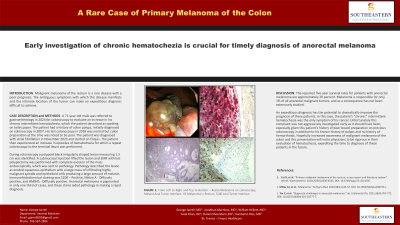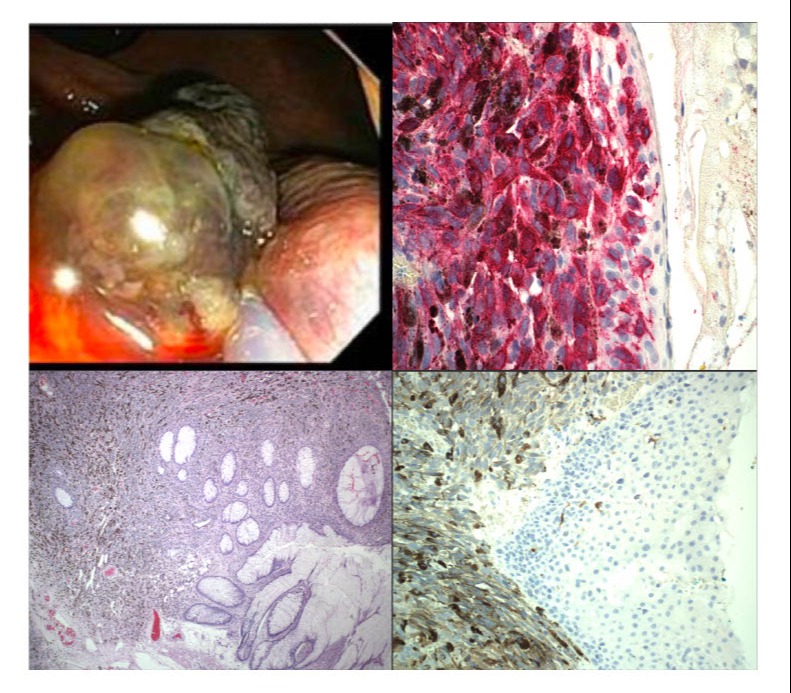Monday Poster Session
Category: Colon
P1996 - A Rare Case of Primary Melanoma of the Colon
Monday, October 28, 2024
10:30 AM - 4:00 PM ET
Location: Exhibit Hall E

Has Audio

Harold George Jarrell, III, MD
St. Francis Hospital
Columbus, GA
Presenting Author(s)
Harold George. Jarrell, MD, Jonathan Martinez, MD, William Willet, MD, Fazal Khan, DO, Daniel Schoenborn, DO, Humberto Rios, MD
St. Francis Hospital, Columbus, GA
Introduction: Malignant melanoma of the rectum is a rare disease with a poor prognosis. The ambiguous symptoms with which this disease manifests and the intimate location of the tumor can make an expeditious diagnosis difficult to achieve.
Case Description/Methods: A 71-year-old male was referred to gastroenterology in 2024 for colonoscopy to evaluate an increase in his chronic intermittent hematochezia, which the patient described as spotting on toilet paper. The patient had a history of colon polyps, initially diagnosed on colonoscopy in 2007. His last colonoscopy in 2018 was normal but colon preparation at the time was noted to be poor. The patient was diagnosed with atrial fibrillation in November 2023 and started on Eliquis. The patient then experienced an increase in episodes of hematochezia for which a repeat colonoscopy to the terminal ileum was performed. During colonoscopy a polypoid black irregularly shaped lesion measuring 1.5 cm was identified. A submucosal injection lifted the lesion and EMR with hot polypectomy was performed with complete excision of the mass endoscopically, which was sent to pathology. Pathology described the lesion as eroded squamous epithelium with a large mass of infiltrating highly malignant spindle and epithelioid cells producing a large amount of melanin. Immunohistochemical staining was S100 – Positive, Melan A - Diffusely positive, and HMB45 - Diffusely positive. Anorectal melanoma is pigmented in only one-third of cases, and these stains aided pathology in making a rapid diagnosis.
Discussion: The reported five-year survival rates for patients with anorectal melanoma are approximately 20 percent. Melanoma is responsible for only 1% of all anorectal malignant tumors, and as a consequence has not been extensively studied.
An expeditious diagnosis has the potential to dramatically improve the prognosis of these patients. In this case, the patient’s “chronic” intermittent hematochezia was the only symptom of his cancer. Unfortunately this complaint was not aggressively investigated early as it should have been, especially given this patient’s history of poor bowel preparation on previous colonoscopy in addition to his known history of polyps and no history of hemorrhoids. Hopefully increased awareness of malignant melanoma of the colon and this presentation will incite physicians to be rigorous in their evaluation of hematochezia, expediting the time to diagnosis of these patients in the future.

Disclosures:
Harold George. Jarrell, MD, Jonathan Martinez, MD, William Willet, MD, Fazal Khan, DO, Daniel Schoenborn, DO, Humberto Rios, MD. P1996 - A Rare Case of Primary Melanoma of the Colon, ACG 2024 Annual Scientific Meeting Abstracts. Philadelphia, PA: American College of Gastroenterology.
St. Francis Hospital, Columbus, GA
Introduction: Malignant melanoma of the rectum is a rare disease with a poor prognosis. The ambiguous symptoms with which this disease manifests and the intimate location of the tumor can make an expeditious diagnosis difficult to achieve.
Case Description/Methods: A 71-year-old male was referred to gastroenterology in 2024 for colonoscopy to evaluate an increase in his chronic intermittent hematochezia, which the patient described as spotting on toilet paper. The patient had a history of colon polyps, initially diagnosed on colonoscopy in 2007. His last colonoscopy in 2018 was normal but colon preparation at the time was noted to be poor. The patient was diagnosed with atrial fibrillation in November 2023 and started on Eliquis. The patient then experienced an increase in episodes of hematochezia for which a repeat colonoscopy to the terminal ileum was performed. During colonoscopy a polypoid black irregularly shaped lesion measuring 1.5 cm was identified. A submucosal injection lifted the lesion and EMR with hot polypectomy was performed with complete excision of the mass endoscopically, which was sent to pathology. Pathology described the lesion as eroded squamous epithelium with a large mass of infiltrating highly malignant spindle and epithelioid cells producing a large amount of melanin. Immunohistochemical staining was S100 – Positive, Melan A - Diffusely positive, and HMB45 - Diffusely positive. Anorectal melanoma is pigmented in only one-third of cases, and these stains aided pathology in making a rapid diagnosis.
Discussion: The reported five-year survival rates for patients with anorectal melanoma are approximately 20 percent. Melanoma is responsible for only 1% of all anorectal malignant tumors, and as a consequence has not been extensively studied.
An expeditious diagnosis has the potential to dramatically improve the prognosis of these patients. In this case, the patient’s “chronic” intermittent hematochezia was the only symptom of his cancer. Unfortunately this complaint was not aggressively investigated early as it should have been, especially given this patient’s history of poor bowel preparation on previous colonoscopy in addition to his known history of polyps and no history of hemorrhoids. Hopefully increased awareness of malignant melanoma of the colon and this presentation will incite physicians to be rigorous in their evaluation of hematochezia, expediting the time to diagnosis of these patients in the future.

Figure: From Left to Right and Top to Bottom: Rectal Melanoma on colonoscopy, MelanA Anal Tumor Interface, HE Melanoma in Rectum, S100 Anal Tumor Interface
Disclosures:
Harold Jarrell indicated no relevant financial relationships.
Jonathan Martinez indicated no relevant financial relationships.
William Willet indicated no relevant financial relationships.
Fazal Khan indicated no relevant financial relationships.
Daniel Schoenborn indicated no relevant financial relationships.
Humberto Rios indicated no relevant financial relationships.
Harold George. Jarrell, MD, Jonathan Martinez, MD, William Willet, MD, Fazal Khan, DO, Daniel Schoenborn, DO, Humberto Rios, MD. P1996 - A Rare Case of Primary Melanoma of the Colon, ACG 2024 Annual Scientific Meeting Abstracts. Philadelphia, PA: American College of Gastroenterology.
